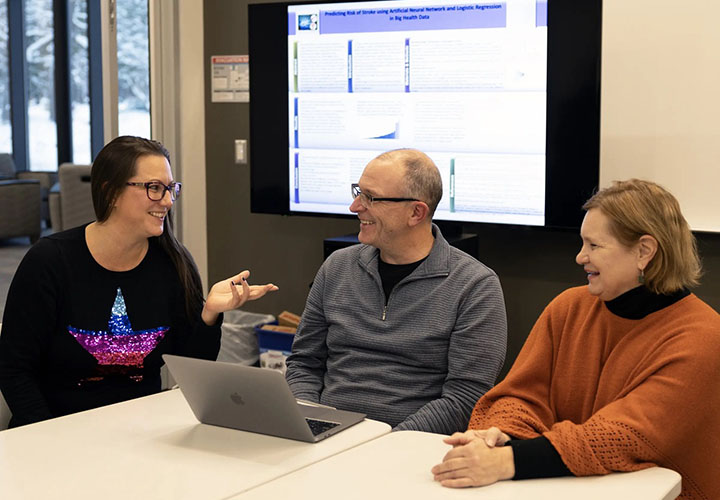December 5, 2024
 Nicole Speelman, Nick Roster and Nancy OlenchekNMC is preparing to become a magnet for future Albert Einsteins and Marie Curies, offering new courses that will allow high school students conducting advanced scientific research to earn college credits as dual enrolled students.
Nicole Speelman, Nick Roster and Nancy OlenchekNMC is preparing to become a magnet for future Albert Einsteins and Marie Curies, offering new courses that will allow high school students conducting advanced scientific research to earn college credits as dual enrolled students.
Eight Advancing Scientific Research (ASR) courses will debut next year, four offered at the high school level and four at NMC. High school instructors from Cadillac to the Mackinac Bridge have been invited to participate, with a stipend funded by the NMC Foundation. These pioneer instructors will receive training in February, and NMC will host its first Science Symposium in April.
The effort is being led by NMC biology instructor Nick Roster, chemistry instructor Nicole Speelman, and Kingsley High School science teacher Nancy Olenchek. A former NMC success coach, Olenchek started a high school research class at Kingsley last year. Through a teacher training organization, she connected her students with mentors at universities like Stanford and Cornell. But in addition to the prestige, Olencheck wanted students to be able to earn college credit.
Enter NMC’s Roster, who last year launched a research project on microplastics contamination with his NMC students.
“They’re doing college level research, no doubt,” he said of Olenchek’s students, citing one who is using fruit fly larva to research generational alcoholism.“It’s only fair for these students, if they’re doing this work, to have it transcribed (as credit),” he said.
The high school teachers will instruct their students in research methodology, and NMC will provide oversight and support.
“No one up here is doing this,” said Roster, adding that the ASR classes eventually could draw students from much farther than Kingsley, as well as students interested in fields beyond natural sciences. Earlier this year NMC trustees passed a dual-enrolled tuition rate that allows high school students to dual enroll from virtually anywhere without incurring out of pocket expenses.
“You do what you want to do. You research your passion,” he said. “This will hopefully be a vehicle for anyone to participate in scientific research.”
The dual-enrolled credit is key.
“It’s a huge benefit to them,” Olencheck said. “It validates their research, No. 1. It gives them some elective credit that they don’t have to pay for.”
The eight-course sequence will allow students to pursue an idea or question through the entire research cycle, from initial framing to gathering data to peer review to potentially publishing and presenting. The top students at the April NMC Science Symposium will go on to the Flint Science and Engineering Fair, the stepping stone to the International Science and Engineering Fair. Prizes and scholarships are available to the winners at these higher levels.
Roster and Olenchek hope that some of these budding scientists elect to stay at NMC.
“There’s not a lot of undergraduate research opportunities,” Roster said. “We have classes set up for them to continue that research. “
“We’re trying to grow our own,” said Olenchek. “We’re trying to make a whole bunch more Hawk Owls.”
